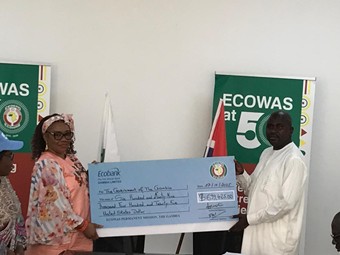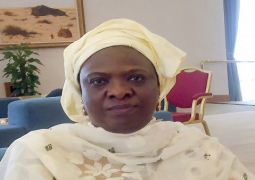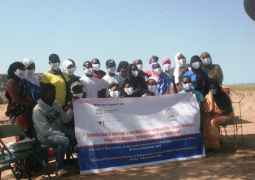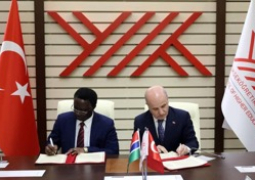
The official presentation and signing ceremony took place at the ECOWAS Head Office in Fajara, marking a pivotal moment in the organisation’s commitment to localisation and grassroots empowerment. The funds, channelled through the Gambia Red Cross Society (GRCS), aim to strengthen national capacity in delivering life-saving support and long-term resilience for those most in need.
Dr Sintiki Ugbe, director of Human Development and Gender at ECOWAS, spoke at length on the significance of the event, which marked the signing of the project agreement between the Government of The Gambia and the GRCS.
“At ECOWAS, one of the key principles advocated by our humanitarian policies is localisation. Therefore, when we collaborate with governments, we actively promote localisation. We do not assign implementing roles to international partners; instead, we empower local organisations to lead humanitarian interventions. This is a momentous occasion, and each and every one of you gathered here has played an important role in what is truly a historic event.
“Whenever there is an opportunity to support vulnerable populations, not only in The Gambia but across the region, it aligns with the 4x4 strategic objectives of the ECOWAS Commission’s management. This makes the event particularly significant for all ECOWAS citizens.”
Ebou Faye, secretary general of the Gambia Red Cross Society, described the event as “a historic moment for the country, especially for GRCS, and most importantly for the vulnerable communities who are about to receive vital support, including refugees and internally displaced persons.”
He noted The Gambia’s unique humanitarian framework: “There are no refugee camps in the country. Instead, we have a special model where host families accommodate refugees within their homes.”
The project aims to support persons of concern, including internally displaced persons (IDPs), refugees, stateless individuals, and host communities across the country. “With this generous funding, we remain committed to ensuring the project delivers essential services such as cash assistance, enabling beneficiaries to purchase food, access education, and receive healthcare,” Mr Faye said.
“The initiative will reach 340 refugees and 1,774 IDPs across all seven administrative regions of The Gambia. It also includes the development of community gardens and boreholes, with a particular focus on Foni in the West Coast Region, which hosts a high concentration of refugees.”
Mr Faye outlined the project’s specific objectives: “We aim to provide quarterly cash transfers of D7,000 to up to 1,774 IDP households via mobile money. Additionally, we will establish community-managed gardens in two locations to generate income and support livelihoods, especially for host families.”
Ismaila Saidy, senior economist at the Ministry of Trade at the ECOWAS National Office, expressed gratitude to ECOWAS for providing such a substantial amount of funding. He emphasised the importance of the initiative, stating: “The objective of this project is to ensure sustainable living and decent livelihoods for refugees, internally displaced persons, and other vulnerable groups in the country.”
Mr Saidy highlighted The Gambia’s unique approach to refugee accommodation: “Unlike many countries, The Gambia does not have refugee camps. Instead, refugees are hosted within our communities, which is a deeply meaningful and compassionate model. Supporting these families is essential to sustaining their livelihoods and fostering resilience.”
He pointed to one of the project’s key interventions – the creation of community gardens: “These gardens will be used by both refugees and host communities. In doing so, we are not only addressing food security and income generation, but also promoting peaceful co-existence between displaced persons and their hosts.”
Mr Saidy assured ECOWAS officials that the Gambian government is committed to ensuring the project’s long-term impact.




